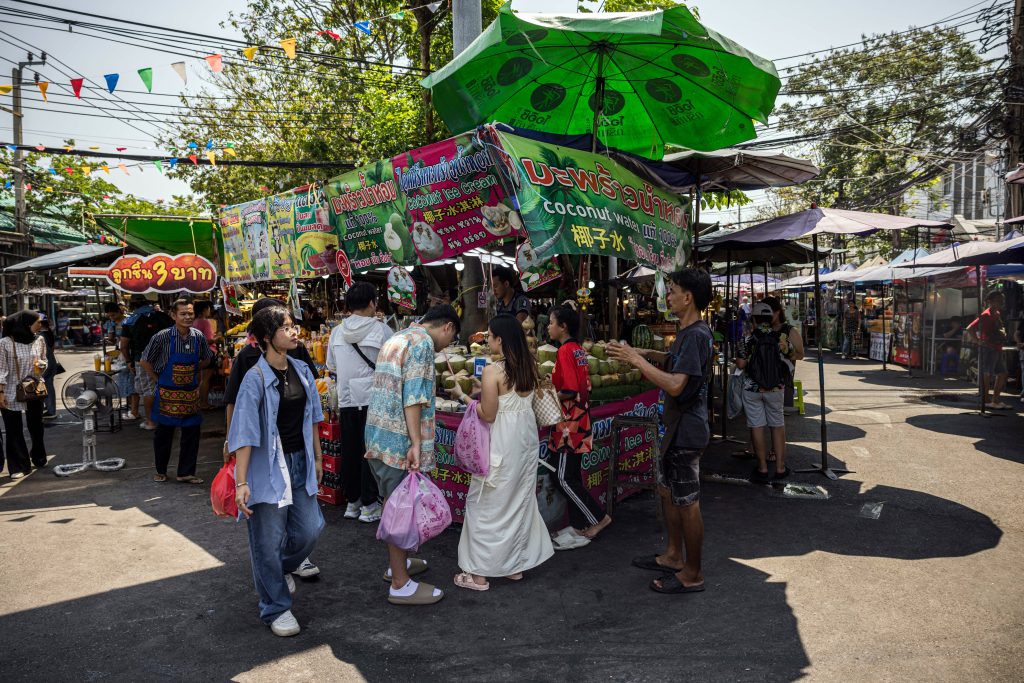
THAILAND significantly lowered its forecast for economic growth this year as the global trade war undercuts private investment and exports, adding to already-weak consumption at home.
Gross domestic product will likely grow 1.3% to 2.3% in 2025, the National Economic and Social Development Council said on Monday. The latest forecast is a full percentage point lower than the previous estimate of 2.3% to 3.3% and more or less aligns it with that of the Bank of Thailand, the World Bank and the International Monetary Fund.
Following the dire outlook, the government decided to put on hold a planned cash handout program and instead use about 157 billion baht ($4.8 billion) budgeted for it to support projects which will generate more jobs and boost competitiveness of the local industries.
If the full-year GDP outturn comes in at the midpoint, it would be Thailand’s weakest print since the pandemic, according to Bloomberg-compiled data. It could take around two years for the economy to recover from the impact of a threatened 36% US tariff and a global trade slowdown, NESDC chief Danucha Pichayanan said at a briefing in Bangkok.
“Economic growth remains constrained by high household and corporate debt burdens and it is expected the growth to be softened in the second half of the year, following the global economic and trade slowdown and the impact of trade protection measures,” it said in a statement.
The benchmark SET Index fell 0.7% to its lowest close since April 29. The baht, which pared gains after the release of the data, was 0.9% higher at 33.07 to a dollar by 4:30 p.m. local time.
Southeast Asia’s second-largest economy is bracing for the possibility of a 36% tariff in the US, its largest export market. Thailand is waiting to start negotiations with Washington to bring down the levies.
“The negotiation results will dictate the Thai economic outlook going forward,” Danucha said. “If the situation remains relaxed like this, our economy should continue to grow without problem. If not, the situation will change.”
Exports will likely grow just 1.8% this year, down from the previous estimate of 3.5% and the 5.8% in notched 2024. Machinery and electronics are Thai exports at risk of losing market share in the US market from the higher tariffs, Danucha said.
Private investment is projected to decline 0.7% in 2025, in line with the exports slowdown. Private consumption, which accounts for the bulk of Thai GDP, is seen growing just 2.4%, down from the previous estimate of 3.3% and the 4.4% in 2024. Government stimulus should boost public consumption and investment, NESDC said.
While Thailand’s economy grew at a faster-than-expected pace last quarter, it was largely driven by a surge in exports as businesses front-loaded orders in a bid to avoid the Trump tariffs.
More Volatility
“The trade situation and foreign exchange may be more volatile and the economy may slow down going forward,” with the impact more clear in the third quarter, Danucha said. He warned businesses and consumers to brace for the risks and be cautious with their spending.
GDP in the January-March period rose 3.1% from a year earlier, beating the 2.9% median estimate in a Bloomberg News survey and comparing to the revised 3.3% pace notched in previous three months. The economy expanded 0.7% quarter-on-quarter, compared with a median estimate for 0.5% growth.
A global trade war would exacerbate Thailand’s already sluggish recovery post-pandemic, with local consumption remaining tepid despite cash handouts, and China’s slowdown hitting the tourism sector. NESDC cut its forecast for tourist arrivals this year to 37 million from 38 million.
Prime Minister Paetongtarn Shinawatra has pledged new stimulus measures, but they may come at the cost of bloating still-elevated government debt levels. Moody’s Ratings lowered Thailand’s credit rating outlook to negative from stable last month as the trade war weighs on its economic and fiscal strength.
The prime minister said some programs are being reviewed in view of an expected shortfall in revenue as the trade war is affecting all countries. New government-initiated projects may help boost growth between 0.7 to 1 percentage point, Finance Minister Pichai Chunhavajira told reporters.
The Bank of Thailand also has “very limited ammunition” after 75-basis points in cuts brought its benchmark key interest rate to 1.75%, Governor Sethaput Suthiwartnarueput said earlier this month. The central bank has warned that GDP growth this year could fall to as low as 1.3% — the slowest pace since the pandemic — in case of a severe trade war and higher US levies. –BLOOMBERG
The post Thailand slashes growth forecast on impact of trade war appeared first on The Malaysian Reserve.
